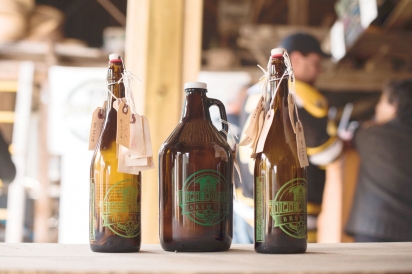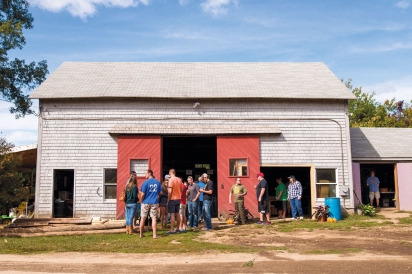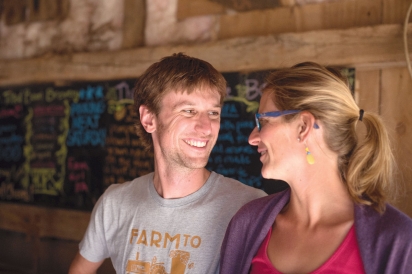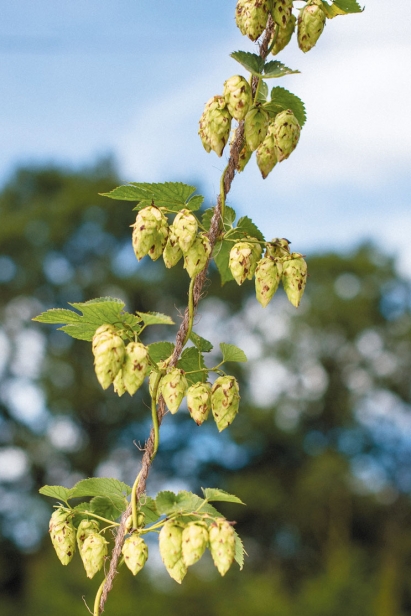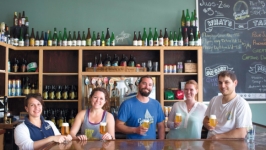Tilted Barn Brewery
It’s Farm to Pint at Rhode Island’s Only Farm Brewery
Just off Route 2 in Exeter lies a hidden gem. Anyone going too fast looking for the turnoff to Schartner Farms would blow right past its entrance, and in doing so would miss something truly special. Invisible from the road, down a country lane cloaked in pines, stands the Tilted Barn Brewery (TBB), the only farm brewery in Rhode Island.
At present, visibility is not a problem, as the TBB has something of a cult following—one large enough to absorb all of its current production. Owners Matt and Kara Richardson both have full-time jobs, as well as two young children, yet despite their busy lives, the couple yearns to expand.
“We seek to grow slowly and sustainably,” says Matt, who grew up going to Brewer’s Heaven in Warwick with his dad. “It was a great place if you wanted to ‘home’ brew but didn’t have enough space at home,” says Matt. Brewer’s Heaven is closed now but for Matt, the brewing seed had been planted.
Back in 2000, Matt took a job working at Schartner Farm in Exeter. He met a girl working there whose family had a farm nearby. That girl was Kara.
In 2005 Kara bought Matt a do-it-yourself kit and together, they got hooked on home brewing. In 2007, Kara’s brother Joel bought some hop rhizomes and the couple used them to start growing hops on the family farm. By 2010, they had over an acre of hops in cultivation, and were producing close to 1,500 pounds of hop cones per year.
“I love working with those guys,” says Derek Luke from Newport Storm Brewing Company. “They grow a fantastic product.”
Matt and Kara soon realized they had to make a choice—farm hops for other brewers, or grow hops and brew beer themselves. The couple chose the latter. “It almost takes an industrial scale to make hop growing profitable,” says Matt. “We are up to about two acres, which is more than enough for our needs. We are a farm brewery, and we use what we grow.” The farm brewery is a new concept in Rhode Island, although it is well established in other states.
At the close of Prohibition in 1933, no provisions were made in Rhode Island for small craft breweries or farm breweries and distribution was funneled between manufacturers, distributors and retailers. All small breweries fall into the “manufacturer” category. The model works for large-scale brewing companies but it doesn’t allow small-scale producers to sell their product directly to customers without limits. Meanwhile, Rhode Island laws allow wineries to produce and sell unlimited wine directly from their vineyards.
In 2006, Newport Storm started the push to allow growler sales (a growler is a 64-ounce bottle typically sold at breweries), but was met with resistance from wholesalers and their lobbyists.
The distributor mark-up accounts for roughly 20% of the final cost of a six-pack of beer, and they seek to maintain the status quo. Pressure from craft brewers and some legislators resulted in S 0236 Substitute A—a compromise law that allows small brewers to sell “samples” not to exceed 72 ounces at tasting events.
“This has made it possible for us to exist but it is a serious limitation,” says Matt. “How many people are going to traverse the state just for a growler fill? It is like a corn farmer only being able to sell corn one ear at a time—it makes farming very difficult.”
When compared to neighboring states, Connecticut (288 ounces per visit) and Massachusetts (unlimited), the limitation becomes clearer. Meanwhile, New York has discovered that farm breweries are a huge boost to the economy. Governor Andrew Cuomo sites statistics on his website showing that farm breweries have resulted in growth across all of the agricultural sectors, particularly in the “agritourism” sphere.
“With the opening of 14 farm breweries since January and a nearly 100% increase in our microbreweries, it is clear that the New York craft beer industry is booming, and this is just the beginning,” Governor Cuomo said. The state actively supports the industry in light of myriad benefits to the economy.
“Regular brewers start their day by heating water and adding grains. Here, we start by feeding the chickens and pulling weeds. We don’t want to be big, just large enough to survive. Large breweries spill more beer in a week than we make all year,” says Matt.
As a hop farm, TBB has access to a large quantity of fresh and flavorful hops. The West Coast style of India Pale Ale (IPA) has been all the rage over the past few years. West Coast IPAs feature a hop-forward taste, higher alcohol and relatively little malt flavor. It involves adding a lot of hops to the boil, which releases the bitter qualities of the hop cones. There are also Midwest IPAs that feature a broader malt balance to the flavor profile.
TBB fancies an emerging style sometimes called the Vermont, or New England, IPA. These beers use hops nearer to the end of the heating cycle. The floral aroma of the hop is more prominent, which allows the malt profile to shine through. While Matt loves hoppy beer, he prefers to use the hops in a way that complements the malts instead of simply overpowering them with bitterness.
In addition to the ever-changing IPA lineup, there are seasonal specials at TBB. Kara and Matt grew pumpkins from seed this year and recently used them to create an extraordinary dark amber pumpkin beer that does not contain any of the all too common cinnamon and spice additives. They rotate various ales and stouts through, as well as seasonal beers. Of note are the spring brews featuring maple sap and spruce tips from their trees. Going forward, they plan to use more garden vegetables in specialty batches. Beets, cucumbers and carrots will join the farm-grown mix.
As Kara and Matt juggle the travails of work, family life and the rebuilding of the historic barn, they also work passionately to advance the cause of farm brewing in Rhode Island.
In addition to working with statehouse representatives, the couple has started an online petition. They love using what grows on the farm to produce unique artisanal beers. They wish to remain small but need the advantage of direct sales to remain viable.
Stop by the farm on Saturdays between 1 and 4 to sample the beer and experience one of Rhode Island’s great hidden treasures. You might wonder then why we don’t have more of these gems to visit and to attract visitors to our little corner of the world.
Tilted Barn Brewery
1 Helmsley Place, Exeter
To check hours of operation and learn more about Tilted Barn Brewery, visit TiltedBarnBrewery.com. There you will find a link to Change.org if you want to voice your support for farm breweries in Rhode Island.



